- Home
- Robert Harris
Enigma Page 2
Enigma Read online
Page 2
‘Then what …?’
‘It’s not Riemann.’ And then he had added, very quietly: ‘There are other things now happening in the world, you know, apart from mathematics …’
Two days later Jericho had found a note in his pigeonhole.
‘Please join me for a glass of sherry in my rooms this evening. F.J. Atwood.’
Jericho turned from Turing’s room. He felt faint. He gripped the worn handrail, taking each step carefully, like an old man.
Atwood. Nobody refused an invitation from Atwood, professor of ancient history, dean of the college before Jericho was even born, a man with a spider’s web of connections in Whitehall. It was tantamount to a summons from God.
‘Speak any languages?’ had been Atwood’s opening question as he poured the drinks. He was in his fifties, a bachelor, married to the college. His books were arranged prominently on the shelf behind him. The Greek and Macedonian Art of War. Caesar as Man of Letters. Thucydides and His History.
‘Only German.’ Jericho had learned it in adolescence to read the great nineteenth-century mathematicians – Gauss, Kummer, Hilbert.
Atwood had nodded and handed over a tiny measure of very dry sherry in a crystal glass. He followed Jericho’s gaze to the books. ‘Do you know Herodotus, by any chance? Do you know the story of Histiaeus?’
It was a rhetorical question; Atwood’s questions mostly were.
‘Histiaeus wished to send a message from the Persian court to his son-in-law, the tyrant Aristagoras, at Miletus, urging him to rise in revolt. However, he feared any such communication would he intercepted. His solution was to shave the head of his most trusted slave, tattoo the message onto his naked scalp, wait for his hair to grow, then send him to Aristagoras with a request that he be given a haircut. Unreliable but, in his case, effective. Your health.’
Jericho learned later that Atwood told the same stories to all his recruits. Histiaeus and his bald slave gave way to Polybius and his cipher square, then came Caesar’s letter to Cicero using an alphabet in which a was enciphered as d, b as e, c as f, and so forth. Finally, still circling the subject, but closer now, had come the lesson in etymology.
‘The Latin crypta, from the Greek root κρπτη meaning “hidden, concealed”. Hence crypt, burial place of the dead, and crypto, secret. Crypto-communist, crypto-fascist … By the way, you’re not either, are you?’
‘I’m not a burial place of the dead, no.’
‘Cryptogram …’ Atwood had raised his sherry to the light and squinted at the pale liquid. ‘Cryptanalysis … Turing tells me he thinks you might be rather good …’
Jericho was running a fever by the time he reached his rooms. He locked the door and flopped face down on his unmade bed, still wearing his coat and scarf. Presently he heard footsteps and someone knocked.
‘Breakfast, sir.’
‘Just leave it outside. Thank you.’
‘Are you all right, sir?’
‘I’m fine.’
He heard the clatter of the tray being set down, and steps retreating. The room seemed to be lurching and swelling out of all proportion, a corner of the ceiling was suddenly huge and close enough to touch. He closed his eyes and the visions came up at him through the darkness –
– Turing, smiling his shy half smile: ‘Tom, I can assure you, I am making no progress on Riemann whatsoever …’
– Logie, pumping his hand in the Bombe Hut, shouting above the noise of the machinery, ‘The Prime Minister has just been on the telephone with his congratulations …’
– Claire, touching his cheek, whispering, ‘Poor you, I’ve really got under your skin, haven’t I, poor you …’
– ‘Stand back’ – a man’s voice, Logie’s voice – ‘Stand back, give him air …’
And then there was nothing.
When he woke, the first thing he did was look at his watch. He’d been unconscious for about an hour. He sat up and patted his overcoat pockets. Somewhere he had a notebook in which he recorded the duration of each attack, and the symptoms. It was a distressingly long list. He found instead the three envelopes.
He laid them out on the bed and considered them for a while. Then he opened two of them. One was a card from his mother, the other from his aunt, both wishing a happy birthday. Neither woman had any idea what he was doing and both, he knew, were guiltily disappointed he wasn’t in uniform and being shot at, like the sons of most of their friends.
‘But what do I tell people?’ his mother had asked him in despair during one of his brief visits home, after he had refused yet again to tell her what he did.
‘Tell them I’m in government communications,’ he had replied, using the formula they had been instructed to deploy in the face of persistent enquiries.
‘But perhaps they’d like to know a little more than that.’
‘Then they’re acting suspiciously and you should call the police.’
His mother had contemplated the social catastrophe of her bridge four being interviewed by the local inspector, and had fallen silent.
And the third letter? Like Kite before him, he turned it over and sniffed it. Was it his imagination or was there a trace of scent? Ashes of Roses by Bourjois, a minuscule bottle of which had practically bankrupted him just a month earlier. He used his slide rule as a paperknife and slit the envelope open. Inside was a cheap card, carelessly chosen – it showed a bowl of fruit, of all things – and a standard message for the circumstances, or so he guessed, never having been in this situation before. ‘Dearest T … always see you as a friend … perhaps in the future … sorry to hear about … in haste … much love …’ He closed his eyes.
Later, after he had filled in the crossword, after Mrs Sax had finished the cleaning, after Bickerdyke had deposited another tray of food and taken it away again untouched, Jericho got down on his hands and knees and tugged a suitcase from beneath his bed and unlocked it. Folded into the middle of his 1930 Doubleday first edition of The Complete Sherlock Holmes were six sheets of foolscap covered in his tiny writing. He took them over to the rickety desk beside the window and smoothed them out.
‘The cipher machine converts the input(plain language, P) into the cipher (Z) by means of a function f. Thus Z=f(P,K) where K denotes the key …’
He sharpened his pencil, blew away the shavings and bent over the sheets.
‘Suppose K has N possible values. For each of the N assumptions we must see if f–1(Z,K) produces plain language, where f–1 is the deciphering function which produces P if K is correct …’
The wind ruffled the surface of the Cam. A flotilla of ducks rode the waves, without moving, like ships at anchor. He put down his pencil and read her card again, trying to measure the emotion, the meaning behind the flat phrases. Could one, he wondered, construct a similar formula for letters – for love letters or for letters signalling the end of love?
‘The input (sentiment, S) is converted into a message (M) by the woman, by means of the function w. Thus M=w(S, V) where V denotes the vocabulary. Suppose V has N possible values …’
The mathematical symbols blurred before his eyes. He took the card into the bedroom, to the grate, knelt and struck a match. The paper flared briefly and twisted in his hand, then swiftly turned to ash.
Gradually his days acquired a shape.
He would rise early and work for two or three hours. Not at cryptanalysis – he burned all that on the day he burned her card – but at pure mathematics. Then he would take a nap. He would fill in The Times crossword before lunch, timing himself on his father’s old pocket watch – it never took him more than five minutes to complete it, and once he finished it in three minutes forty. He managed to solve a series of complex chess problems – ‘the hymn tunes of mathematics’, as G.H. Hardy called them – without using pieces or a board. All this reassured him his brain had not been permanently impaired.
After the crossword and the chess he would skim through the war news while trying to eat something at his desk. He tried to avo
id the Battle of the Atlantic (DEAD MEN AT THE OARS: U-BOAT VICTIMS FROZEN IN LIFEBOATS) and concentrated instead on the Russian Front: Pavlograd, Demiansk, Rzhev … the Soviets seemed to recapture a new town every few hours and he was amused to find The Times reporting Red Army Day as respectfully as if it were the King’s Birthday.
In the afternoon he would walk, a little further on each occasion – at first confining himself to the college grounds, then strolling through the empty town, and finally venturing into the frozen countryside – before returning as the light faded to sit by the gas fire and read his Sherlock Holmes. He began to go into Hall for dinner, although he declined politely the Provost’s offer of a place at High Table. The food was as bad as at Bletchley, but the surroundings were better, the candlelight flickering on the heavy-framed portraits and gleaming on the long tables of polished oak. He learned to ignore the frankly curious stares of the college staff. Attempts at conversation he cut off with a nod. He didn’t mind being solitary. Solitude had been his life. An only child, a stepchild, a ‘gifted’ child – always there had been something to set him apart. At one time he couldn’t speak about his work because hardly anyone would understand him. Now he couldn’t speak of it because it was classified. It was all the same.
By the end of his second week he had actually started to sleep through the night, a feat he hadn’t managed for more than two years.
Shark, Enigma, kiss, bombe, break, pinch, drop, crib – all the weird vocabulary of his secret life he slowly succeeded in erasing from his conscious mind. To his astonishment, even Claire’s image became diffuse. There were still vivid flashes of memory, especially at night – the lemony smell of newly washed hair, the wide grey eyes as pale as water, the soft voice half amused, half bored – but increasingly the parts failed to cohere. The whole was vanishing.
He wrote to his mother and persuaded her not to visit him.
‘Nurse Time,’ the doctor had said, snapping shut his bag of tricks, ‘that’s who’ll cure you. Mr Jericho. Nurse Time.’
Rather to Jericho’s surprise it seemed that the old boy was right. He was going to be well again. ‘Nervous exhaustion’ or whatever they called it was not the same as madness after all.
And then, without warning, on Friday 12 March, they came for him.
The night before it happened he had overheard an elderly don complaining about a new air base the Americans were building to the east of the city.
‘I said to them, you do realise you’re standing on a fossil site of the Pleistocene era? That I myself have removed from here the horncores of Bos primigenius? D’you know, the fellow merely laughed …’
Good for the Yanks, thought Jericho, and he decided there and then it would make a suitable destination for his afternoon walk. Because it would take him at least three miles further than he had attempted so far, he left earlier than usual, straight after lunch.
He strode briskly along the Backs, past the Wren Library and the icing sugar towers of St John’s, past the sports field in which two dozen little boys in purple shirts were playing football, and then turned left, trudging beside the Madingley Road. After ten minutes he was in open country.
Kite had gloomily predicted snow, but although it was still cold it was sunny and the sky was a glory – a pure blue dome above the flat landscape of East Anglia, filled for miles with the silver specks of aircraft and the white scratches of contrails. Before the war he had cycled through this quiet countryside almost every week and had barely seen a car. Now an endless succession of big American trucks lumbered past him, forcing him on to the verge – brasher, faster, more modern than British Army lorries, covered over at the back with camouflaged tarpaulins. The white faces of the US airmen peered out of the shadows. Sometimes the men shouted and waved and he waved back, feeling absurdly English and self-conscious.
Eventually he came within sight of the new base and stood beside the road watching three Flying Fortresses take off in the distance, one after the other – vast aircraft, almost too heavy, or so it seemed to Jericho, to escape the ground. They lumbered along the fresh concrete runway, roaring with frustration, clawing at the air for liberation until suddenly a crack of daylight appeared beneath them, and the crack widened, and they were aloft.
He stood there for almost half an hour, feeling the air pulse with the vibrations of their engines, smelling the faint scent of aviation spirit carried on the cold air. He had never seen such a demonstration of power. The fossils of the Pleistocene era, he reflected with grim delight, must now be so much dust. What was that line of Cicero that Atwood was so fond of quoting? ‘Nervos belli, pecuniam infinitam.’ The sinews of war, unlimited money.
He looked at his watch and realised he had better turn back if he was going to reach the college before dark.
He had gone about a mile when he heard an engine behind him. A jeep overtook him, swerved and stopped. The driver, wrapped in a heavy overcoat, stood up and beckoned to him.
‘Hey, fella! Wanna lift?’
‘That would be kind. Thank you.’
‘Jump in.’
The American didn’t want to talk, which suited Jericho. He gripped the edges of his seat and stared ahead as they bounced and rattled at speed down the darkening lanes and into the town. The driver dropped him at the back of the college, waved, gunned the engine, and was gone. Jericho watched him disappear, then turned and walked through the gate.
Before the war, this three-hundred-yard walk, at this time of day, at this time of year, had been Jericho’s favourite: the footpath running across a carpet of mauve and yellow crocuses, the worn stones lit by ornate Victorian lamps, the spires of the chapel to the left, the lights of the college to the right. But the crocuses were late, the lanterns had not been switched on since 1939, and a static water tank disfigured the famous aspect of the chapel. Only one light gleamed faintly in the college and as he walked towards it he gradually realised it was his window.
He stopped, frowning. Had he left his desk light on? He was sure he hadn’t. As he watched, he saw a shadow, a movement, a figure in the pale yellow square. Two seconds later the light went on in his bedroom.
It wasn’t possible, was it?
He started to run. He covered the distance to his staircase in thirty seconds and took the steps like an athlete. His boots clattered on the worn stone. ‘Claire?’ he shouted. ‘Claire?’ On the landing his door stood open.
‘Steady on, old thing,’ said a male voice from within, ‘you’ll do yourself a mischief.’
3
Guy Logie was a tall, cadaverous man, ten years older than Jericho. He lay on his back on the sofa facing the door, his neck on one armrest, his bony ankles dangling over the other, long hands folded neatly on his stomach. A pipe was clamped between his teeth and he was blowing smoke rings at the ceiling. Distended haloes drifted upwards, twisted, broke and melted into haze. He took his pipe from his mouth and gave an elaborate yawn which seemed to take him by surprise.
‘Oh, God. Sorry.’ He opened his eyes and swung himself into a sitting position. ‘Hello, Tom.’
‘Oh please. Please, don’t get up,’ said Jericho. ‘Please, I insist, make yourself at home. Perhaps I could get you some tea?’
‘Tea. What a grand idea.’ Before the war Logie had been head of mathematics at a vast and ancient public school. He had a Blue in rugger and another in hockey and irony bounced off him like pebbles off an advancing rhinoceros. He crossed the room and grasped Jericho by the shoulders. ‘Come here. Let me look at you, old thing,’ he said, turning him this way and that towards the light. ‘Oh dear oh dear, you do look bloody terrible.’
Jericho shrugged himself free. ‘I was fine.’
‘Sorry. We did knock. Your porter chap let us in.’
‘Us?’
There was a noise from the bedroom.
‘We came in the car with the flag on it. Greatly impressed your Mr Kite.’ Logie followed Jericho’s gaze to the bedroom door. ‘Oh, that? That’s Leveret! Don’t mind him.’ H
e took out his pipe and called: ‘Mr Leveret! Come and meet Mr Jericho. The famous Mr Jericho.’
A small man with a thin face appeared at the entrance to the bedroom.
‘Good afternoon, sir.’ Leveret wore a raincoat and trilby. His voice had a slight northern accent.
‘What the hell are you doing in there?’
‘He’s just checking you’re alone,’ said Logie sweetly.
‘Of course I’m bloody well alone!’
‘And is the whole staircase empty, sir?’ enquired Leveret. ‘Nobody in the rooms above or below?’
Jericho threw up his hands in exasperation. ‘Guy, for God’s sake!’
‘I think it’s all clear,’ said Leveret to Logie. ‘I’ve already closed the blackout curtain in there.’ He turned to Jericho. ‘Mind if I do the same here, sir?’ He didn’t wait for permission. He crossed to the small leaded window, opened it, took off his hat and thrust his head out, peering up and down, left and right. A freezing mist was off the river and a blast of chill air filled the room. Satisfied, Leveret ducked back inside, closed the window and drew the curtains.
There was a quarter of a minute’s silence. Logie broke it by rubbing his hands and saying: ‘Any chance of a fire, Tom? I’d forgotten what this place was like in winter. Worse than school. And tea? You mentioned tea? Would you like some tea, Mr Leveret?’
‘I would indeed, sir.’
‘And what about some toast? I noticed you had some bread, Tom, in the kitchen over there. Toast in front of a college fire? Wouldn’t that take us back?’
Jericho looked at him for a moment. He opened his mouth to protest then changed his mind. He took a box of matches from the mantelpiece, struck a light and held it to the gas fire. As usual the pressure was low and the match went out. He lit another and this time it caught. A worm of flame glowed blue and began to spread. He went across the landing to the little kitchen, filled the kettle and lit the gas ring. In the bread bin there was indeed a loaf – Mrs Saxmundham must have put it there earlier in the week – and he sawed off three grey slices. In the cupboard he found a pre-war pot of jam, surprisingly presentable after he had scraped the white fur of mould from its surface, and a smear of margarine on a chipped plate. He arranged his delicacies on a tray and stared at the kettle.

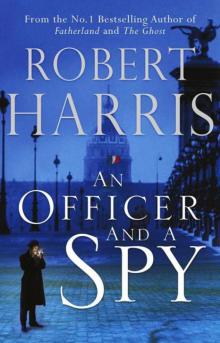 An Officer and a Spy
An Officer and a Spy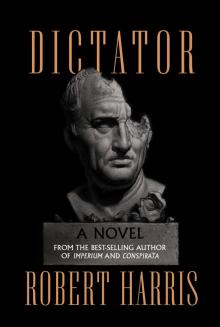 Dictator
Dictator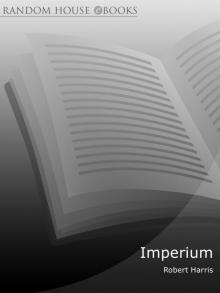 Imperium:
Imperium: Enigma
Enigma Fatherland
Fatherland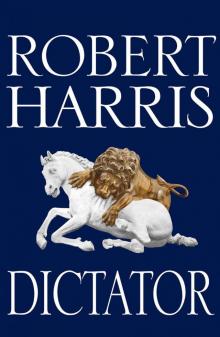 Dictator:
Dictator: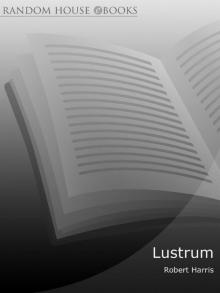 Lustrum
Lustrum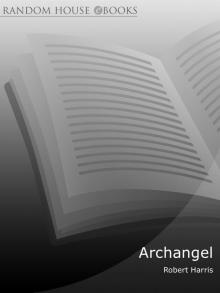 Archangel
Archangel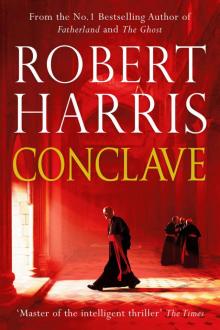 Conclave
Conclave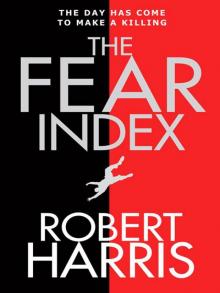 The Fear Index
The Fear Index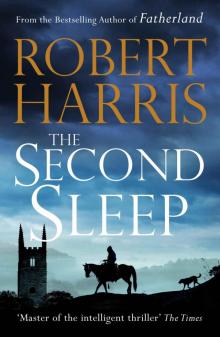 The Second Sleep
The Second Sleep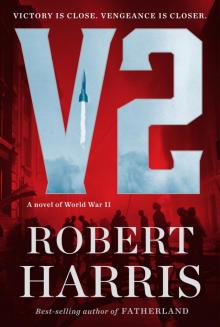 V2
V2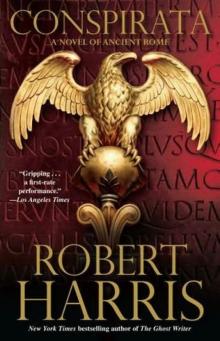 Lustrum c-2
Lustrum c-2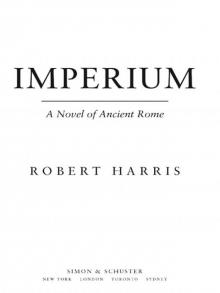 Imperium
Imperium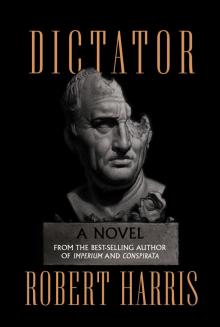 The Dictator
The Dictator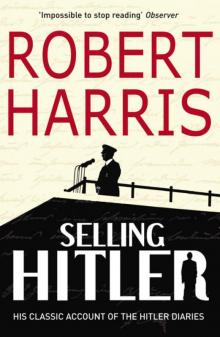 Selling Hitler
Selling Hitler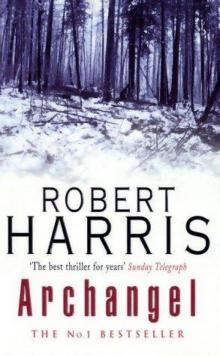 Archangel (Mass Market Paperback)
Archangel (Mass Market Paperback)